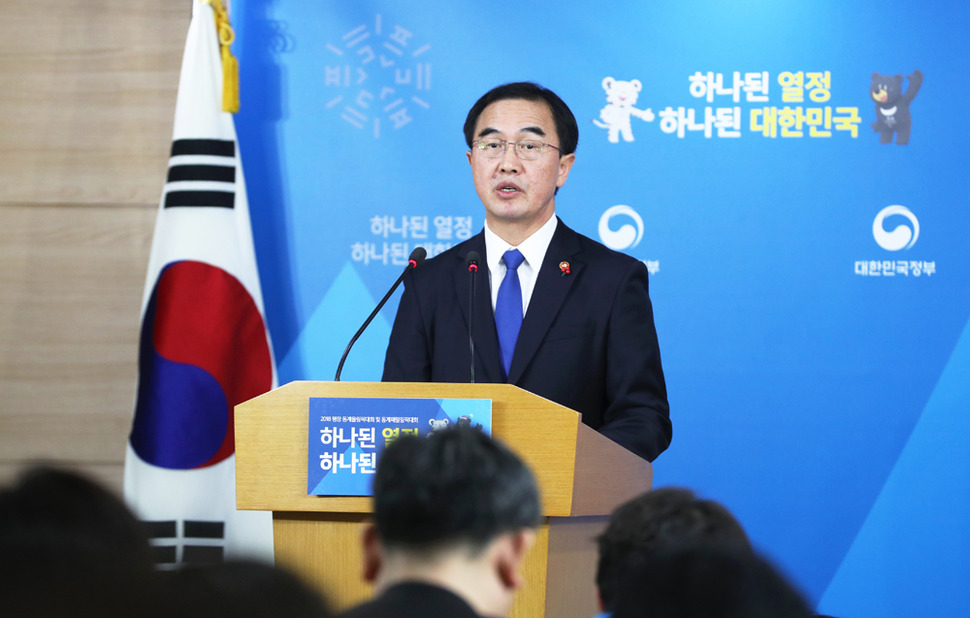Posted on : Jan.3,2018 18:01 KST
Modified on : Jan.3,2018 18:23 KST
 |
|
Unification Minister Cho Myung-gyon speaks at a press conference inter-Korean talks at the central government office in Seoul’s Jongno District on Jan. 2. (Yonhap News)
|
On Jan. 2, just one day after North Korean leader Kim Jong-un announced his willingness to send a delegation to the Pyeongchang Winter Olympics, the South Korean government proposed holding high-level talks with North Korea. A balmy breeze seems to be blowing for once on the stormy seas of inter-Korean relations. Now that North Korea’s supreme leader has expressed his willingness for the North to participate in the Pyeongchang Winter Olympics and to engage in dialogue with South Korea, we hope that his behavior will be different from before.
If high-level inter-Korean talks are held, there will first need to be a detailed discussion about North Korea’s participation in the Pyeongchang Winter Olympics. But since the talks Seoul proposed are to be high-level, their agenda could include not only the North Korean delegation’s participation in the Olympics but also current issues affecting inter-Korean relations. It would even be possible to discuss holding working-level military talks and Red Cross talks. Seoul proposed such talks in July 2017 but never received a response.
For its part, North Korea might try to get South Korea to commit to delaying or halting its joint military exercises with the US. As the Moon administration waits for North Korea’s response, it needs to remain flexible and stay open to various possibilities.
If this proves to be an opportunity to make contact with North Korea and to restore the lines of communication at Panmunjeom that were cut under the previous administration, that alone will be half the battle. And if, on top of that, North Korea’s participation enables the Pyeongchang Olympic Games to become the “Peace Olympics,” this could serve as the basis for lowering tensions and moving a step toward bringing peace to the Korean Peninsula, as well as finding a peaceful solution to the North Korean nuclear issue. For this reason, South Korea should not be too ambitious in these high-level talks but should instead put the priority on creating an opportunity to steer the direction of the Korean Peninsula from heightened military tensions toward dialogue.
Some South Korean conservatives regard Kim Jong-un’s New Year’s address as a North Korean scheme to drive a wedge between South Korea and the US and to foment division in South Korean society. As such, they have even called for a stern response and tougher sanctions against the North. All of us are aware that North Korea might have such motivations. Nevertheless, now is the time for us to make a proactive effort to plant a tiny seed of dialogue.
We hope that those conservatives will consider who exactly is fomenting division inside South Korean society. The current situation on the Korean Peninsula does not give us the luxury of nitpicking about North Korea’s intentions and writing off dialogue. This is a time when we must hold onto the slightest opportunity. Conservative politicians who have often used security matters to their political advantage need to refrain from the cynical strategy of instigating hostility toward North Korea and using this as a weapon to criticize the current administration.
Please direct questions or comments to [english@hani.co.kr]






